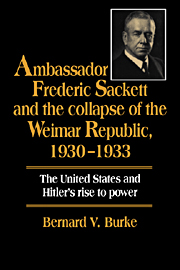Book contents
- Frontmatter
- Contents
- Acknowledgments
- Abbreviations used in the notes
- Introduction
- 1 A time of opportunity
- 2 American diplomacy, official and unofficial
- 3 The landslide election
- 4 Sackett takes the initiative
- 5 Sackett and the financial crisis
- 6 Perceptions of Nazism and communism, with an afterthought on fascism
- 7 One end, two paths: Brüning and Hitler in conflict
- 8 Efforts to sustain representative government in Germany
- 9 Sackett loses heart with Brüning's fall
- 10 The decline of Hitler and the Nazis
- 11 Through a glass darkly
- Conclusion
- Bibliography
- Index
10 - The decline of Hitler and the Nazis
Published online by Cambridge University Press: 30 September 2009
- Frontmatter
- Contents
- Acknowledgments
- Abbreviations used in the notes
- Introduction
- 1 A time of opportunity
- 2 American diplomacy, official and unofficial
- 3 The landslide election
- 4 Sackett takes the initiative
- 5 Sackett and the financial crisis
- 6 Perceptions of Nazism and communism, with an afterthought on fascism
- 7 One end, two paths: Brüning and Hitler in conflict
- 8 Efforts to sustain representative government in Germany
- 9 Sackett loses heart with Brüning's fall
- 10 The decline of Hitler and the Nazis
- 11 Through a glass darkly
- Conclusion
- Bibliography
- Index
Summary
Two new concerns would occupy Ambassador Sackett, frequently taking him away from the embassy chancery in Berlin. He would return to the United States to campaign for the reelection of President Hoover and busy himself with the organization of the economic conference he and Brüning had worked to realize. Meanwhile, Hitler's fortunes seemed to deteriorate beyond redemption. Before Sackett left for home in early October 1932, the outlook appeared to be optimistic for Hoover, and the international economic community appeared prepared to remedy its problems. There even seemed to be a good chance that the politics of the Weimar Republic could be resolved in a satisfactory way. But what struck Sackett as encouraging for a time would dissolve into one misfortune after another. Events and forces beyond Sackett's control worked to undo his best efforts.
As a political appointee, Sackett was obliged to campaign on behalf of his benefactor, President Hoover. It was a task the ambassador undertook gladly, and with enthusiasm. After Brüning's fall he wanted to get back to the United States right away. He could use the distraction. Sackett wanted to return home even before Brüning's resignation, but Hoover felt it was too soon for the ambassador to leave his post.
It was mid-August before the president informed the State Department that he was “anxious” for the ambassador to return to the United States in the fall. Castle and others discussed the matter and came to the conclusion that there was no immediacy because Hoover had not yet decided on “a clear cut policy for Sackett to preach.”
- Type
- Chapter
- Information
- Publisher: Cambridge University PressPrint publication year: 1995



